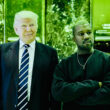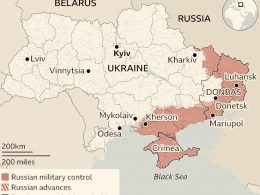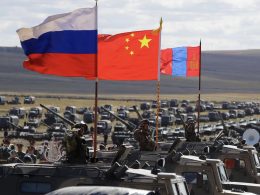To defeat the state, we in the core of imperialism need to make U.S. hegemony too weakened for our ruling class to be able to use it to hold back revolution. And to cripple the beast by attacking it from within its heart, we need to take away the social base Washington depends on to be able to maintain its global war machine; that social base being the U.S. working class.
The only reason most Americans at the moment accept NATO’s psyops is because they haven’t yet been exposed to the anti-imperialist perspective; should they be given the opportunity to consider that perspective, many of them will react to it not with angry rejection (as the materially comfortable liberals do), but with anger towards their government for all its lies and imperial crimes. As commentator Declan Hayes has observed: “though our initial baby steps away from Biden and the BBC might, at first, seem trivial and of no consequence, when solid masses of us abandon them, their inevitable day of reckoning will hit them all the quicker.” We have the ability to bring most Americans towards anti-imperialism, and to thereby advance the revolutionary struggle.
A “socialism” that opposes serious anti-imperialist practice
The thing that’s so far stopped us from doing this is not the supposed labor-aristocratic character of the American workers—who at this point mostly lack the living standards required for them to be labor aristocrats—it’s the failure of this country’s self-described revolutionaries to do what’s necessary. The three-letter agencies wouldn’t be able to sabotage the USA’s revolutionary organizations so easily if these orgs were to take their job seriously; if they were to stop letting their thinking and practice be influenced by the imperialism-compatible left.
The Party for Socialism and Liberation is the most significant example of this failure at the moment, because it’s an org that’s won the trust of many Marxist-Leninists in large part by putting forth material that counters anti-Chinese propaganda. In order to appeal to liberals, who’ve been brought to an obstinately anti-Russian stance by Russiagate, the PSL has at the same time made an effort to distance itself from Russia; as well as from Russia’s acts of defiance against U.S. hegemony.
With the coming of the Ukraine proxy war, and its prompting of political actors to take sides, the PSL’s Brian Becker has explained why he feels it’s justified from a Marxist perspective for his org to disavow Russia’s special military operation. The rationale he’s put forth, as articulated in his interview with Abby Martin, is that the help Russia has provided with the transition to multipolarity supposedly hasn’t represented a net gain for the class struggle…
Martin: A lot of people are saying that this is good, Brian. Because you have this counterweight officially standing against the U.S., this profound shift is taking place that is going to benefit the world in a positive way that no matter what the outcome here is, that Russia asserting itself on the global stage will inevitably prevent the cataclysmic war that would have happened come Ukraine joined NATO. So…is it good that unipolarity has been challenged?
Becker: I hear all the time people who hate U.S. imperialism and the unipolar world, where the U.S. could try to destroy government after government after government, sanction them, impose draconian economic sanctions so that even if it wasn’t occupying or bombing, they’re still killing the people and ruining whole countries, making their economies scream. People want an option, they’re thinking ‘that’s the unipolar world, what we need is the multipolar world.’…as a Leninist, I think this is a very superficial understanding of world politics…we had a multipolar world all the way up until world war II, what did it bring us? The multipolar world brought us World War I, the multipolar world brought us World War II…if you go back to the Berlin Conference of 1884, all the imperialists sat there, and they took a map of Africa, and they divided it up amongst themselves…the only solution is not multipolarity, the only solution is socialism…in order for that to happen, we have to have independent socialist movements. How can we make radical change in America by saying “Vladimir Putin is our leader?”
Martin: Well said, especially since these forces that are in the multipolar world are also anti-communist.
This is the disgrace to socialist practice and dialectical analysis that happens when American socialists willfully ignore the lesson articulated by Kim Il Sung: “The differences of state socio-political systems, political views or religious beliefs can by no means be an obstacle in the way of joint struggle against U.S. imperialism.”
Becker talks about the need for an independent socialist movement, yet by opposing multipolarity, he’s reinforcing the socialist movement’s dependence on the Democratic Party. The only effect he’s having by taking this stance is to keep his org relegated to liberal circles, without challenging the anti-Russian beliefs that these liberals hold; which renders hollow his calls elsewhere in the interview to expose the warmongering of our government, because such an endeavor can only be successful on the basis of a pro-multipolar practice.
Not only is Becker obscuring the reality that advancing multipolarity is an indispensable step towards reaching socialism; he’s actively hindering the effort to reach socialism. The essence of his argument is that socialism, due to its non-competitive nature, is the only thing which can truly bring peace; yet by letting the perfect (socialism) be the enemy of the good (multipolarity), he’s making that ideal end goal less achievable.
PSL disavows the same multipolar project it’s previously celebrated
To support his argument, Becker also implores us to read the PSL’s book Imperialism in the 21st century: Updating Lenin’s theory a century later, which was partly written by Becker himself. Yet even as Becker implies anti-Washington countries like Russia will inevitably continue the cycle of war which is intrinsic to capitalism in its highest stage (imperialism), this book dispels not just the notion that these countries can be defined as imperialist; but the notion that their intent is to acquire imperialist holdings at any point in the future:
Those who describe the emerging powers in the formerly colonized world as “sub-imperialist” typically do so to suggest that these countries serve to enforce the dictates of the imperialist world order against smaller states, while trying to bring advantages to themselves. But all states that are part of the global capitalist economy are, by very definition, playing a subordinate role and serving as a circuit for the imperialist system, while also seeking to make the most of advantages over their neighbors and competitors. Nearly every state could therefore be described as sub-imperialist or as sub-sub-imperialist (and so on) in relation to another state…Given this general situation, it seems best to describe these as capitalist states emerging inside the shell of imperialism. These newly emerging capitalist powers seek to increase their influence within the system…Many of these states are creating blocs to increase their leverage within the global order. At present, their international goals in general are not to replace the United States as global hegemon, nor to acquire colonial territory, nor to build up a second global economy to rival the first. [Emphasis mine.] Instead, it is to receive a proportionate position in the leading spheres of the global economy, and join the club of developed nations.
Becker and the PSL’s other ideological leaders are fully aware that Washington’s modern geopolitical challengers aren’t imperialist powers, any more than the Soviet Union was; yet they’ve disavowed Russia’s project to weaken U.S. hegemony (and by their logic China’s as well) on the basis that these powers are simply going to repeat the cycle of monopoly capital expansion and war. This narrative of theirs is made all the more dishonest by how the PRC, like the USSR, is a socialist state, and therefore also lacks incentive to become imperialist; that socialist China is the foremost beneficiary of multipolarity, and therefore of anti-hegemonic actions like Russia’s special operation, is the context which they leave out when they make today’s multipolar forces out to be primarily anti-communist in character.
This point alone is enough to shatter Becker and Martin’s arguments; to oppose multipolarity is to oppose the tangible ways multipolarity has already allowed China to undo the legacy of colonialism. By the assessment of one of the PSL’s own resources from 2019, these initiatives by China have not only been lessening the poverty caused by Euro-American imperialism; they’ve been breaking the historical cycles that would otherwise cause the old imperialist powers to be replaced with new ones:
China has led the construction of electric dams in over 10 African countries, recently winning the contract for a major project in Ethiopia…China is also at the forefront of the air connectivity on the continent, funding a range of airports in various countries…In 2018, China and 47 mainly sub-Saharan African nations announced a partnership entitled “10,000 villages” designed to deepen the penetration of satellite television services into the country…China announced this year that it will be covering the vast majority of the costs for Ethiopia’s first satellite, which follows on the heels of a similar deal between China and Nigeria last year to launch two satellites…All of these efforts, of course, bring their share of contradictions. But to call them “colonial” or “neo-colonial” obscures far more than it explains. China’s investments, loans, and grants are aimed against neo-colonial patterns [emphasis mine], and objectively offer many African nations’ opportunities to break total dependence on the Global North, increase their own economic capacities and, by extension, their negotiating position with the West.
These ways that the PSL’s own analyses undermine its arguments for opposing Russia have been made all the more damning by how directly due to the special operation, China’s Belt and Road Initiative has gained further opportunities to expand. As Pepe Escobar wrote this January, it’s apparent from observing Russia and China’s recent diplomatic relationship that the Ukraine conflict has prompted these and other countries to further embrace the BRI. This greater willingness to create an alternative path for the globe also applies to things like the new BRICS currency, which threatens the dollar’s hegemony. That’s what’s apparent from Escobar’s observations:
The year 2022 ended with a Zoom call to end all Zoom calls: Presidents Vladimir Putin and Xi Jinping discussing all aspects of the Russia-China strategic partnership in an exclusive video call. Putin told Xi how “Russia and China managed to ensure record high growth rates of mutual trade,” meaning “we will be able to reach our target of $200 billion by 2024 ahead of schedule.” On their coordination to “form a just world order based on international law,” Putin emphasized how “we share the same views on the causes, course, and logic of the ongoing transformation of the global geopolitical landscape.” Facing “unprecedented pressure and provocations from the west,” Putin noted how Russia-China are not only defending their own interests “but also all those who stand for a truly democratic world order and the right of countries to freely determine their own destiny.”
To be fair, the interview between Martin and Becker was from February of 2022, so they hadn’t yet been able to see these developments. I say that facetiously though, because anybody who was looking at the global situation honestly could from the start see these things were coming.
And I doubt that what’s since happened will change their stance, even though Putin’s words above are the best possible evidence that Russia isn’t going to suddenly become imperialist once it gets enough power. Socialist China is the one between them with by far the most influence, and this will continue to be true as far as present trends go; therefore even if Russia’s capital were to get strong enough for conquering smaller countries to become in its interests (which likely won’t happen) it would then be held accountable by China. China is capable of ensuring that imperialism no longer menaces the globe after the U.S. empire’s fall, and it’s preemptively doing this by getting Russia to agree to the altruistic goals Putin described.
Russia has committed to helping China build a cooperative world where no country can any longer be invaded, unless it does what Ukraine has done and commit crimes against humanity. The premise of Becker’s argument—this being that the coming era of multipolarity will have the same character as the last one—doesn’t have sufficient evidence. There’s much more evidence against it than for it. What the PSL has done by disavowing multipolarity is effectively go back upon the ideas found within its previous pro-China material, which were clearly pro-multipolar in their effect and maybe even in their intent. PSL hasn’t stopped producing pro-China material, but every time it does, it now comes from a place of being fundamentally opposed to the historical steps necessary for advancing China’s projects to assist the formerly colonized world.
Vilifying anti-imperialist actions from a “socialist” perspective
The big problem getting in the way of us building an effective anti-imperialist movement is that we have prominent figures calling themselves “Leninists,” while actively fighting against the transition to a historical stage that’s a prerequisite to global proletarian victory. Like bourgeois revolutions were at one point worth supporting from a communist perspective, due to these revolutions having at that time been necessary for creating the conditions which make communism realizable, at this moment multipolarity is crucial for communists to support.
Becker implicitly accuses every communist who takes the pro-Russia stance of relying on a bourgeois government for their leadership; a bold accusation to make of the Korean Workers Party, whose foundational Juche ideology is about self-sufficiency in Korea’s revolution. The WPK has praised Russia’s action because this is the correct stance for communists to take, from both an anti-fascist and an anti-imperialist perspective. By putting forth this narrative about the new multipolarity representing a reversion to the old one, Becker seeks to make it seem like he’s justified in opposing the most immediate way to end the U.S. imperial crimes that he starts his answer by talking about. What he’s actually doing is creating a rationale for why we should accept the continuation of these crimes for the time being, since the most immediate alternative to them is supposedly just as bad.
Isn’t this how the NATO apologists talk? They argue that a U.S.-dominated world, with all its horrors, is something we should accept for the sake of “protecting” the world from “rogue states.” These anti-multipolar socialists argue from the same analytical framework, where the ways the multipolar forces are advancing peace and democracy get disregarded in favor of paranoid expectations about them coming to act as global menaces. As the new cold war further escalates, and the left opportunists experience more pressure to appease liberal views of global affairs, they’re going to more and more abandon whatever anti-imperialist ideas they’ve previously put forth. We’re going to see them increasingly reinforce the State Department’s narratives about why a given country is in the wrong for helping weaken U.S. hegemony.
Becker has already begun to do this by minimizing the extent to which Nazism is relevant within Ukraine; with the implication behind this argument being that Operation Z can’t truly be considered a new Great Patriotic War, but a war foremost motivated by profit. To be able to disregard how Putin’s government had to be pressured into taking action by more principled anti-imperialist forces, like Russia’s communists, Becker has to argue that the humanitarian concerns of these forces were exaggerated. Which he does by repudiating the idea (or rather demonstrable reality) that Ukraine is a fascist state. He says: “Unfortunately some people in the west think that all of Ukraine is Nazified, which is not true. That’s not what Ukraine is, that’s not a correct, accurate, objective assessment.”
He says that even though Nazis have been incorporated into the military, in terms of the country’s government, “Ukraine on the main is not Nazi, it’s not a pro-Nazi country, it’s not a pro-fascist country, and in the 2019 parliamentary elections, the political forces that formed the United Right Block, which are the fascist forces, they got about 2.1% of the vote.” This attempt to portray the influence of Nazism in Ukraine as being vastly overstated by the Russian government wasn’t merely a reminder not to overgeneralize about the character of the Ukrainian people; it was about making it look like there was no humanitarian justification for dismantling Ukraine’s military. Since according to Becker and Martin’s narrative, there’s supposedly a sufficient separation between the Nazis in the military and the Ukrainian government itself. Martin makes this clear by saying, with of course no pushback from Becker: “I think it’s important to not reflexively take the PR of a huge capitalist country.”
There’s another indication that the analysis Becker and Martin put forth is not informed by a serious investigation of the situation; it’s a fallacy to act like the geographical size of Russia in itself means Russia is especially inclined to lie about the motives behind its foreign policy decisions. Becker, Martin, and the others within their ideological circle know that Russia is neither an imperialist power, nor has the intent of replacing the U.S. as a global tyrant; their own literature says so. And if their argument is that Russia’s government took the action merely for the benefit of the country’s relatively small capital, why did Putin have to be pressured into it in large part by the communists? Given that Martin blankedly characterizes the multipolar forces as anti-communist in nature, it at least makes sense why she and Becker totally leave out this context within their analysis.
Whitewashing a fascist regime
That’s not their worst lie of omission though; the worst one is where they obscure the reality that Ukraine is a fascist state, a fascist state that was actively attempting to slaughter and ethnically cleanse the Russian-speaking communities in the Donbass directly prior to when Russia’s action saved these communities. Zelensky’s government is the ideological successor to the government the U.S. installed in Ukraine’s 2014 Euromaidan coup, which brought to power a prime minister who declared the separatists to be “subhuman” and a defense minister who articulated a plan for putting the Russian speakers into “filtration” camps before forcibly resettling them across different parts of Ukraine.
Not only were these officials openly dehumanizing entire communities, and announcing intentions to violate their human rights; they were already committing war crimes against these communities, in the form of a continuous campaign of Donbass shelling that led to mass graves. And they were doing this in retaliation for these communities having democratically and constitutionally voted to separate from Ukraine; a mass decision that was carried out due to the coup regime’s open association with Banderism, the ideology of the Nazi collaborators who the regime has regularly celebrated as anti-communist “heroes.”
Like Becker and Martin will recognize the reality of U.S. imperialism’s crimes while opposing the most immediate practical way to end these crimes, they’ll recognize the war crimes of the Ukrainian state while claiming this state’s intent hasn’t been racist or genocidal. Which is what they need to do to support their argument that Russia shouldn’t have taken the only realistic action it could to destroy Banderism’s tools for committing these war crimes. The reality that Ukraine increased the rate of its Donbass shelling by 400% prior to when Russia took action in February of last year shows Kiev had every intent to invade the breakaway region, and to then realize the previous administration’s ethnic cleansing plan.
We know it had this same intent as the last administration because whatever ways Zelensky initially differed from his pro-fascist predecessor, he was soon made to act as a stooge for the Banderist terrorists who truly rule Ukraine. As Max Blumenthal has described this transition in his policies: “Following his failed attempt to demobilize neo-Nazi militants in the town of Zolote in October 2019, Zelensky called the fighters to the table, telling reporters ‘I met with veterans yesterday. Everyone was there – the National Corps, Azov, and everyone else.’ A few seats away from the Jewish president was Yehven Karas, the leader of the neo-Nazi C14 gang…By offering to carry out acts of spectacular violence on behalf of anyone willing to pay, the hooligans have fostered a cozy relationship with various governing bodies and powerful elites across Ukraine.”
Saying Ukraine isn’t a fascist state because its people haven’t voted in fascists is like saying Germany in 1933 wasn’t a fascist state because the Nazi Party hadn’t been democratically elected into power. Hitler didn’t need to be elected, he was able to be installed by the country’s bourgeoisie as part of a project to manage capitalism’s crises. Ukraine’s oligarchs have backed the U.S. empire’s installation and maintenance of a fascist shadow government because fascism is capitalism’s tool for fortifying itself against potential threats. Threats like class struggle that could arise within Ukraine, due to the country’s extreme post-Soviet corporate looting and neoliberal shock therapy.
This is the essence of why Ukraine is a fascist state: fascism isn’t an ideology, it’s a practice, a practice where the bourgeoisie implement measures to stop the existing socioeconomic order from being overthrown. We see this in Ukraine’s laws banning the use of Russian in public life; in how the government-backed fascist militias have normalized violence against those the state considers to be undesirables; in Ukraine’s criminalization of speech that talks about the crimes of the country’s Nazi collaborators; in the atrocities committed by Ukraine’s national guard; in Zelensky’s project to make Ukraine into a “big Israel,” where this same national guard gets incorporated into daily life; in Zelensky’s banning of opposition parties, following when the communist party became the first one to be banned shortly after the coup; in the government’s calls for the murder of the Kononovitch brothers in retaliation for their organizing a communist youth movement. These things are proof on their own that Ukraine is fascist.
If Becker wanted to, he could use the topic of Ukraine to teach a quite valuable lesson about the nature of fascism as it relates to class war. He doesn’t want to though, because he prefers to go with whatever narratives will make PSL more appealing to liberals. Which in this case is the narrative that Russia isn’t justified in demilitarizing a modern fascist state.
The Ukraine conflict has prompted the PSL to reveal itself as willing to contradict correct parts from its own literature; to try to narratively sabotage actions that represent the most immediately practical ways of ending U.S. imperialism’s crimes; to discard the historical materialist principle that reaching Marxism’s ideal end goal is only possible after taking the necessary steps; to whitewash the actions and beliefs of fascists; to discard the geopolitical perspectives of communist parties that are actually in power, and that have valuable things to teach us; to smear forces that are primarily communist in nature as anti-communist. It’s willing to do these things all for the sake of recruiting a few thousand more liberals. Such a party is not capable of winning the class struggle, as it’s divorced itself from what’s in the interests of the people. It’s only capable of winning over a niche of liberals who are open to Marxism, as long as it’s a “Marxism” that doesn’t challenge their pro-imperialist beliefs.
————————————————————————
If you appreciate my work, I hope you become a one-time or regular donor to my Patreon account. Like most of us, I’m feeling the economic pressures amid late-stage capitalism, and I need money to keep fighting for a new system that works for all of us. Go to my Patreon here.
To keep this platform effective amid the censorship against dissenting voices, join my Telegram channel








